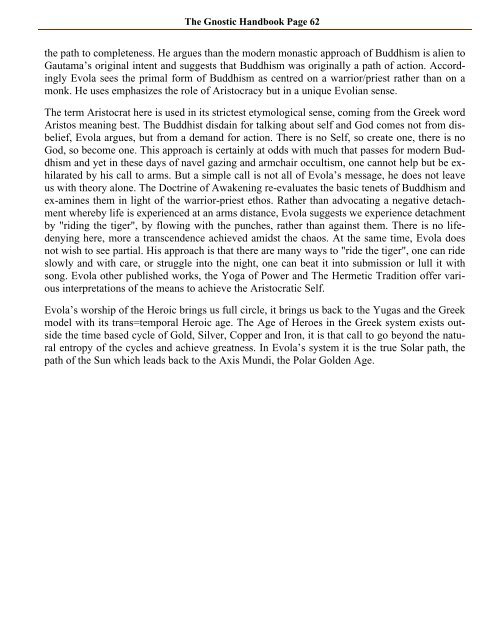gnostic handbook
gnostic handbook
gnostic handbook
You also want an ePaper? Increase the reach of your titles
YUMPU automatically turns print PDFs into web optimized ePapers that Google loves.
The Gnostic Handbook Page 62<br />
the path to completeness. He argues than the modern monastic approach of Buddhism is alien to<br />
Gautama’s original intent and suggests that Buddhism was originally a path of action. Accordingly<br />
Evola sees the primal form of Buddhism as centred on a warrior/priest rather than on a<br />
monk. He uses emphasizes the role of Aristocracy but in a unique Evolian sense.<br />
The term Aristocrat here is used in its strictest etymological sense, coming from the Greek word<br />
Aristos meaning best. The Buddhist disdain for talking about self and God comes not from disbelief,<br />
Evola argues, but from a demand for action. There is no Self, so create one, there is no<br />
God, so become one. This approach is certainly at odds with much that passes for modern Buddhism<br />
and yet in these days of navel gazing and armchair occultism, one cannot help but be exhilarated<br />
by his call to arms. But a simple call is not all of Evola’s message, he does not leave<br />
us with theory alone. The Doctrine of Awakening re-evaluates the basic tenets of Buddhism and<br />
ex-amines them in light of the warrior-priest ethos. Rather than advocating a negative detachment<br />
whereby life is experienced at an arms distance, Evola suggests we experience detachment<br />
by "riding the tiger", by flowing with the punches, rather than against them. There is no lifedenying<br />
here, more a transcendence achieved amidst the chaos. At the same time, Evola does<br />
not wish to see partial. His approach is that there are many ways to "ride the tiger", one can ride<br />
slowly and with care, or struggle into the night, one can beat it into submission or lull it with<br />
song. Evola other published works, the Yoga of Power and The Hermetic Tradition offer various<br />
interpretations of the means to achieve the Aristocratic Self.<br />
Evola’s worship of the Heroic brings us full circle, it brings us back to the Yugas and the Greek<br />
model with its trans=temporal Heroic age. The Age of Heroes in the Greek system exists outside<br />
the time based cycle of Gold, Silver, Copper and Iron, it is that call to go beyond the natural<br />
entropy of the cycles and achieve greatness. In Evola’s system it is the true Solar path, the<br />
path of the Sun which leads back to the Axis Mundi, the Polar Golden Age.


